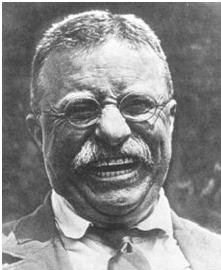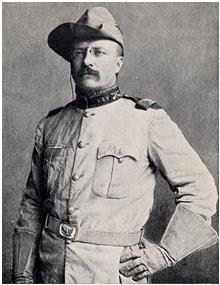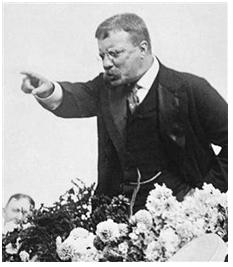 |
| Theodore Roosevelt (http://callisto.ggsrv.com/imgsrv/Fetch?recordID=uewb_09_img0611&contentSet=UXL&banner=4becdf4c&digest=60e453326b596e6ba30391836258d662) |
"Speak softly and carry a big stick; you will go far" (Roosevelt, Theodore qtd. in Roosevelt, Tweed). This quote is a translation of a West African proverb, and it means that using tactful measures to resolve disagreements while holding a metaphorical “big stick” will get one “far.” Roosevelt used this strategy in numerous negotiations, probably since it will not antagonize any party. Because Roosevelt used peaceful and diplomatic measures to solve international disagreements, protected the environment, and inspired others with his courage and charisma, Theodore Roosevelt deserves hero status.
 |
| TR as a |
Theodore Roosevelt was born on October 27, 1858 in New York City. According to an article in Student Resource Center Gold, “As a child, "Teedie" suffered from asthma. Until the age of 11, he was a sickly, puny, fair-haired, nearsighted lad interested in natural history to the exclusion of most other childhood activities”(Roosevelt, Theodore (1858-1919)). He exercised and became stronger. He became a colonel during the Spanish American War, and he “… took command of the unit in Cuba and distinguished himself in a bold charge up the hill next to San Juan. In late summer 1898 he returned home as a war hero and was nominated for governor of New York” (Roosevelt, Theodore). After several achievements, including writing a couple of books, serving in the New York State Assembly, and bettering the New York City police force, he was elected vice president along with McKinley as President. Since an assassin killed McKinley about a year after reelection, Theodore Roosevelt became president. As president, Roosevelt combated trusts, which is “when a group of firms or corporations combines or cooperates in order to control prices or reduce competition” (Roosevelt, Theodore). “In 1905, Roosevelt helped end the Russo-Japanese War” (Gable). After his very progressive second term, he “…selected William Howard Taft, his secretary of war, to succeed him” (Gable), while Roosevelt went on a trip to Africa to hunt. When Roosevelt returned to the United States, he ran for president. However, since Taft became the Republican Candidate, Roosevelt had to form the Progressive Party, also known as the Bull Moose Party (Gable). “died at his home in Oyster Bay, Long Island, on January 6, 1919” (Roosevelt, Theodore).
Theodore Roosevelt solved problems abroad with peaceful ways. For example, after the Russo-Japanese War, “…the president served as mediator in the peace talks [between the Russians and the Japanese] that led to the Treaty of Portsmouth” (Gable). This shows that Roosevelt is fully capable of relieving international tension. Moreover, his accomplishment is ever so tremendous, because he stepped out of his way to help a cause that would probably not give him any benefit. Also, “he [Theodore Roosevelt] successfully mediated international disputes over Venezuela, the Dominican Republic and Morocco” (Roosevelt). Roosevelt proved himself many times that he can successfully resolve international figurative bickering. One of Roosevelt’s areas of expertise includes resolving international disagreements. “…he obtained for Latin American nations equal status with the rest of the world, and won the adoption of the Drago Doctrine, which outlawed the use of force in the collection of foreign debts”(Roosevelt). Making the forceful collection of debts harder for all countries, including the United States, is truly an act for the greater good. Roosevelt was still willing to act in the interest of Latin American, although the Drago Doctrine might hinder the United States’ attempts in the collection of debts. His skill in mediation and goodwill served the world well.
Theodore Roosevelt promoted environmental conservation. For example, Tweed Roosevelt, Theodore Roosevelt’s great-grandson, “Altogether, in the seven-and-one-half years he [Theodore Roosevelt] was in office, he provided federal protection for almost 230 million acres, a land area equivalent to that of all the East Coast states from Maine to Florida” (Roosevelt). The area of land Roosevelt conserved was monumental. America would be a different place without Roosevelt’s environmental preservation. Also, “By March 1909 Roosevelt's use of his executive power had resulted in the transfer of 125 million acres to the forest reserves…Sixteen national monuments and fifty-one wildlife refuges had been established, and the number of national parks had been doubled” (Roosevelt, Theodore). Theodore Roosevelt significantly helped the cause of conservation in the United States. This shows that Roosevelt remains a major factor in accelerating conservation domestically. According to Tweed Roosevelt, “during his tenure in the White House from 1901 to 1909, he designated 150 National Forests, the first 51 Federal Bird Reservations, 5 National Parks, the first 18 National Monuments, the first 4 National Game Preserves, and the first 21 Reclamation Projects” (Roosevelt). Therefore, it is reasonable to infer that few presidents have made such great strides in conservation. Few presidents have given such concern to the environment as Roosevelt did. Theodore Roosevelt protected America’s environment to an incredible extent.
 |
| Roosevelt giving a speech (http://www.altergroup.com/alter-care-blog/wp-content/uploads/2009/07/071011_nobel_roosevelt_vmed12p_widec.jpg) |
In conclusion, Theodore Roosevelt inspired many. His courage, charisma and his ability to solve problems peacefully makes Roosevelt a hero. From a weak child, to a tough soldier, and an able president, Theodore Roosevelt absolutely deserves the title: “hero.”
Page created on 5/19/2010 12:00:00 AM
Last edited 5/19/2010 12:00:00 AM
